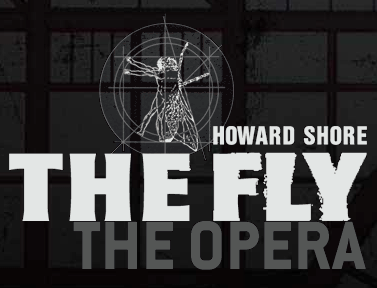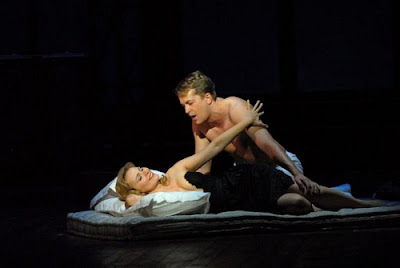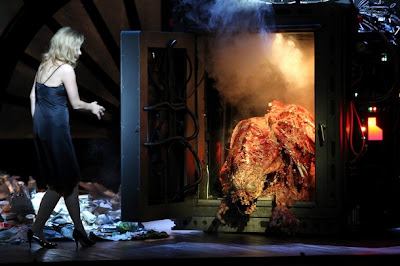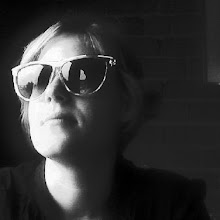
Sergei and I saw the LA Opera's production of The Fly this evening. It was directed by David Cronenberg with music by composer Howard Long, the director and composer of the the 1986 version of the film. The english libretto was by David Henry Hwang, librettist of Madama Butterfly. The opera was set in the 1950s as a nod to the original SciFi film, though the plot was nearly identical to the 1986 version.
 Before I delve into the details I will say that overall I enjoyed the opera, and I highly encourage others to see it. The sets, costumes, and singers were great. It was actually the most elaborate set I've yet seen at an opera. The set was designed by Dante Ferretti who did the set for Tim Burton's Sweeney Todd. At one point Daniel Okulitch, who plays Seth Brundle in the opera, hangs upside down and sings. Tell me, what other opera has that?! Still, it was the plot I liked best.
Before I delve into the details I will say that overall I enjoyed the opera, and I highly encourage others to see it. The sets, costumes, and singers were great. It was actually the most elaborate set I've yet seen at an opera. The set was designed by Dante Ferretti who did the set for Tim Burton's Sweeney Todd. At one point Daniel Okulitch, who plays Seth Brundle in the opera, hangs upside down and sings. Tell me, what other opera has that?! Still, it was the plot I liked best.I have not seen the original 1958 version of The Fly. I've only seen Cronenberg's versions, both movie and opera, and I like them. I like the underlying themes that its viewers are forced to confront.
One of the most prominent themes in the story is that of our own mortality and the fact that each days brings us ever closer to death. Seth Brundle's accelerated decline serves to make more poignant his imminent demise. He is a man who is at his peak, having just discovered love and also an invention capable of "changing the world as we know it." Still, fate knows no bounds, and time inevitably marches on. David Cronenberg said, "we've all got the disease, the disease of being finite."

There is the issue of alienation in the age of technology which is becoming ever more prominent in our world. In The Fly Brundle isolates himself from the world by throwing himself into his work, an invention that is meant to "change the world as we know it." He is redeemed by Veronica Quaife, who offers him companionship and love, only to be re-isolated after his invention goes terribly wrong. It is a parallel to modern technology (cell phones and the internet) in the sense that these inventions, which were meant to make communication more accessible, seem to have instead resulted in a decline in face to face contact.
 The Fly also offers an interesting insight into innocence and knowledge of the flesh. Brundle has trouble getting his invention to work on living things because he is unable to teach the computer about the flesh since he himself does not understand it. After he and Veronica fall in love and he gains carnal knowledge he is able to teach the computer and successfully teleports a monkey. His knowledge of the flesh does not lead to his downfall. On the contrary, it lends itself to the invention of something that will "change the world as we know it." (His actual downfall is the result of an accident brought on by a compulsive decision.)
The Fly also offers an interesting insight into innocence and knowledge of the flesh. Brundle has trouble getting his invention to work on living things because he is unable to teach the computer about the flesh since he himself does not understand it. After he and Veronica fall in love and he gains carnal knowledge he is able to teach the computer and successfully teleports a monkey. His knowledge of the flesh does not lead to his downfall. On the contrary, it lends itself to the invention of something that will "change the world as we know it." (His actual downfall is the result of an accident brought on by a compulsive decision.)  One of the biggest themes of The Fly is the crossroads of science and ethics. This is not a new refrain. Every new scientific discovery and invention brings with it its own controversy. From the fabled Tower of Babel to the LHC, the larger the implications of the discovery the greater the dissension. As a learned and sagacious moustachioed man once said, "with great power comes great responsibility." While I am on the subject of science I want to add that I loved that the protagonist was a scientist. I loved that science permeated the opera. Since most operas were written decades and even centuries ago, it is nice to have a modern operatic hero for geeks to rally around. Plus, the science jokes and dry humor was fabulous. (Q: Why did the chicken cross the mobius strip? A: To get the same side.)
One of the biggest themes of The Fly is the crossroads of science and ethics. This is not a new refrain. Every new scientific discovery and invention brings with it its own controversy. From the fabled Tower of Babel to the LHC, the larger the implications of the discovery the greater the dissension. As a learned and sagacious moustachioed man once said, "with great power comes great responsibility." While I am on the subject of science I want to add that I loved that the protagonist was a scientist. I loved that science permeated the opera. Since most operas were written decades and even centuries ago, it is nice to have a modern operatic hero for geeks to rally around. Plus, the science jokes and dry humor was fabulous. (Q: Why did the chicken cross the mobius strip? A: To get the same side.) Finally, The Fly looks at the time-old question of whether one must be whole and perfect to be loved. This theme comes up more often in the opera, perhaps because operas are supposed to be classical. Veronica asks multiple times whether one needs to be "whole," "perfect," or "beautiful" to deserve love. It harks back to Oedipus, Quasimodo, and Beauty and the Beast. Alfred Adler, one of the founders of the psychoanalytic movement, believed that in order for individuals with deformities to overcome feelings of inferiority they must either compensate with magnanimity of character or superordinary achievements, or they must decompensate with disfunctional and asocial behavior. Brundle does all three. He performs feats of extraordinary physical strength, then he hides himself away in his laboratory, and finally he tells Veronica she must leave him because he might hurt her. Ultimately, Veronica remains in love with Brundle. Veronica of the opera even decides (and in the english libretto reaffirms it for the audience about a hundred times) that she will have Brundle's child.
Finally, The Fly looks at the time-old question of whether one must be whole and perfect to be loved. This theme comes up more often in the opera, perhaps because operas are supposed to be classical. Veronica asks multiple times whether one needs to be "whole," "perfect," or "beautiful" to deserve love. It harks back to Oedipus, Quasimodo, and Beauty and the Beast. Alfred Adler, one of the founders of the psychoanalytic movement, believed that in order for individuals with deformities to overcome feelings of inferiority they must either compensate with magnanimity of character or superordinary achievements, or they must decompensate with disfunctional and asocial behavior. Brundle does all three. He performs feats of extraordinary physical strength, then he hides himself away in his laboratory, and finally he tells Veronica she must leave him because he might hurt her. Ultimately, Veronica remains in love with Brundle. Veronica of the opera even decides (and in the english libretto reaffirms it for the audience about a hundred times) that she will have Brundle's child.In a related theme, a character's outward appearance is not necessarily an indication of that character's inner self. If a disfigured character proves to be kind and venerable it reinforces the principle that deformity is not tantamount to inner evil. Brundlefly of the opera was not nearly as easy to empathize with as Brundlefly of the movie. "I am an insect who dreamed he was a man and loved it, but now the dream is over and the insect is awake." Unfortunately, Opera Brundlefly devolves quickly into a barbaric and savage creature that lacks any semblance of humanity. I thought the film had a more effective ending, with Brundlefly begging Veronica for a mercy killing while Veronica cries. In the opera Veronica does kill Brundlefly, but it is not at his request, and she doesn't seem distraught when she shoots him.


The Fly opera definitely supplied an ample amount of food for thought, but it must be noted that the music wasn't anything to get excited about. I'm not saying it was terrible, but it just wasn't memorable. There is not a single aria or duet or any other piece of music that stands out in mind.
The libretto is the first I've heard in english, so I don't know how others are (I will see Madama Butterfly later this year, and perhaps The Grapes of Wrath too) but it sounded simplistic, repetitive and awkward. In short, it bugged me. Okay, okay, that was lame. My apologies. Perhaps all libretto's sound this way to the native speaker of the libretto's language.
 Left to Right: Placido Domingo - conductor, Howard Shore - composer, Ruxandra Donose - Veronica Quaife, Daniel Okulitch - Seth Brundle.
Left to Right: Placido Domingo - conductor, Howard Shore - composer, Ruxandra Donose - Veronica Quaife, Daniel Okulitch - Seth Brundle.

No comments:
Post a Comment